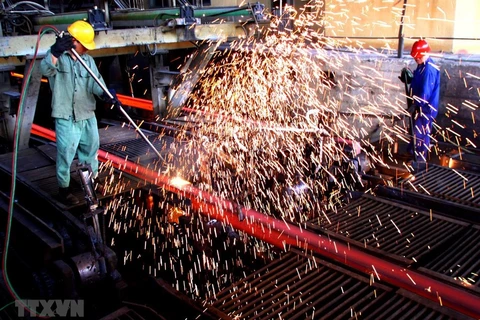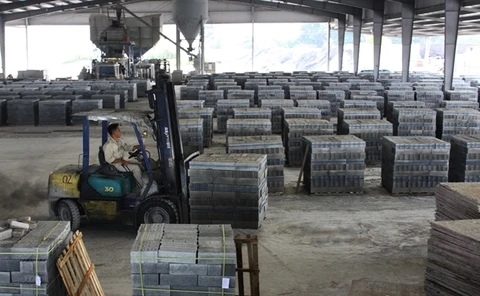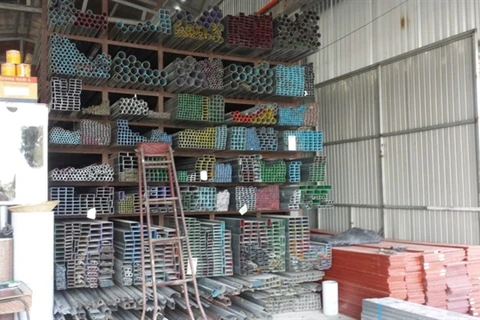HCM City (VNS/VNA) - Vietnam has advantages to develop a materials industry but has not developed in line with its potential, Tran Tuan Anh, Chairman of the Party Central Committee’s Economic Commission, said at a conference held on April 10 in Ho Chi Minh City.
“Domestic materials still have not met the demand of main manufacturing industries, which has led to dependence on imported ones,” Anh said.
The low competitive capacity of the materials industry was because of limited technology, quality, costs, and manufacturing competence.
Lack of qualified human resources for the materials industry was also one of the causes for the limitation, he said.
“The country’s industrial development, international trade agreements, and Industry 4.0’s influence require Vietnam to have a new mindset and approach in developing human resources for the materials industry,” he said.
“The reality is that no country can carry out industrialisation successfully without a developed materials industry because it has an important role in providing input materials for the manufacturing sector.”
Phan Bach Thang of the Vietnam National University-HCM City noted that the materials industry major each year had about 800 students and 25-40 postgraduates.
“Compared to the human resources in the southern region, the current training scale at VNUHCM’s member universities is low,” Thang said.
According to the Ministry of Education and Training, the country has 116 majors at educational institutions related to the materials industry in the 2019-2020 academic year. More than 134,000 students in these majors were trained as of 2019, accounting for 11 per cent of all students.
Minister of Science and Technology Huynh Thanh Dat said the ministry had paid more attention to training high-quality staff in research on new materials.
“Science and technology as well as innovation are the important driving forces for industry’s development,” Dat said.
He said the country should have more policies to attract overseas Vietnamese and foreign experts to do research in the field.
The ministry had also provided counselling to the government on policies to develop science and technologies, with priority given to the materials industry.
According to Dr Nguyen Dinh Hau, general director of the ministry's department of science and technology for economic technical branches, the number of scientists in this industry is low and equipment for research is limited.
Enterprises and organisations in the country, however, have mastered advanced technologies to make new kinds of materials that have the same quality as foreign ones.
But several new materials produced in the country based on research have failed to meet manufacturers’ demands.
Anh said that delegates at the conference should address the barriers and problems in policies to develop human resources and technologies for the industry.
The conference on human resources in the material industry was organised by the Central Economic Commission, Ministry of Science and Technology, and VNUHCM.
This was the first conference at which the Central Economic Commission collected ideas from domestic and foreign experts to develop policies for the country's industrialization and modernization goals by 2030 with a vision to 2045./.
“Domestic materials still have not met the demand of main manufacturing industries, which has led to dependence on imported ones,” Anh said.
The low competitive capacity of the materials industry was because of limited technology, quality, costs, and manufacturing competence.
Lack of qualified human resources for the materials industry was also one of the causes for the limitation, he said.
“The country’s industrial development, international trade agreements, and Industry 4.0’s influence require Vietnam to have a new mindset and approach in developing human resources for the materials industry,” he said.
“The reality is that no country can carry out industrialisation successfully without a developed materials industry because it has an important role in providing input materials for the manufacturing sector.”
Phan Bach Thang of the Vietnam National University-HCM City noted that the materials industry major each year had about 800 students and 25-40 postgraduates.
“Compared to the human resources in the southern region, the current training scale at VNUHCM’s member universities is low,” Thang said.
According to the Ministry of Education and Training, the country has 116 majors at educational institutions related to the materials industry in the 2019-2020 academic year. More than 134,000 students in these majors were trained as of 2019, accounting for 11 per cent of all students.
Minister of Science and Technology Huynh Thanh Dat said the ministry had paid more attention to training high-quality staff in research on new materials.
“Science and technology as well as innovation are the important driving forces for industry’s development,” Dat said.
He said the country should have more policies to attract overseas Vietnamese and foreign experts to do research in the field.
The ministry had also provided counselling to the government on policies to develop science and technologies, with priority given to the materials industry.
According to Dr Nguyen Dinh Hau, general director of the ministry's department of science and technology for economic technical branches, the number of scientists in this industry is low and equipment for research is limited.
Enterprises and organisations in the country, however, have mastered advanced technologies to make new kinds of materials that have the same quality as foreign ones.
But several new materials produced in the country based on research have failed to meet manufacturers’ demands.
Anh said that delegates at the conference should address the barriers and problems in policies to develop human resources and technologies for the industry.
The conference on human resources in the material industry was organised by the Central Economic Commission, Ministry of Science and Technology, and VNUHCM.
This was the first conference at which the Central Economic Commission collected ideas from domestic and foreign experts to develop policies for the country's industrialization and modernization goals by 2030 with a vision to 2045./.
VNA
























